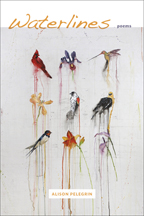
In Waterlines, Louisiana native Alison Pelegrin gives us poems that describe the terrible power of nature even as they underscore the state’s beauty. The poet moves from the familiar gaudy delights of life in New Orleans to immerse the reader in the vastly different experience of living north of Lake Pont-chartrain. In this fractured world, the Bogue Falaya River becomes a highway paved with benedictions, psalms, and praise for ordinary things, as Pelegrin searches the unfamiliar for an incarnation of home.
Water—the threat of hurricanes and floods, as well as the tangled geographies and histories of the rivers and lakes themselves—sustains the poet as she settles into the casual beauty of “the daily route,” finding spiritual depth and delight in both human and natural wonders.
In another life, in Japan, I could write
that I have begun the descent down Mt. Fuji,
only to find that snow is the same on both sides.
Here, I’m bound to heat and words of water,
because even as the world loosens its hold
on me, the rivers are slow to release.
What else is worth saying?
The days wind down, I drag my hand
through the moon’s golden scribble
on the river.
I’m amazed yet again by frog song
and snowfall stars, but there’s no more changing
the words inked on my paper boat.
—from “Bogue Falaya Death Barge”
Alison Pelegrin is the author of four poetry collections, including Waterlines. She has received a fellowship from the National Endowment of the Arts as well as an ATLAS grant from the Louisiana Board of Regents. She is writer-in-residence at Southeastern Louisiana University.
“Waterlines resonated with my Louisiana soul.”—Monroe News-Star
“After the flooding from Hurricane Katrina, a displaced family, in Waterlines, has moved ‘across the Lake,’ leaving urbane, Catholic, funky New Orleans for ‘the rural South, where no one’s sneaky about violence.’ ‘(O)mens and holy rollers…were staked out / at our back door with pamphlets //and loaves of bread.’ With her fine ear for speech rhythms and the characteristic phrase, and her mystic’s eye for precise detail and intensity, Pelegrin give us poems dense with the sights, smells, sounds, and finally the value, of this new present. The poems embody the resilience we need: ‘Outside the doublewide I’ll stand/and bless creation in its disarray.’ And they offer a ‘Prayer of Forgiveness’ any of us could pray in a strange land: ‘God forgive my open eyes, my unrepentant gawking.’”—Ava Leavell Haymon, author of Eldest Daughter
“It’s said that figures as different as Jefferson and Goethe were comfortable in the world because they were at home at Monticello and Weimar, respectively, and the same is true of Alison Pelegrin. Waterlines starts locally and then radiates outward, not geographically so much as emotionally and spiritually. There are poems about faith, poems of wry and even scary self-examination, poems that combine these themes and more. Pelegrin stays close to her roots yet journeys out and back, ranging widely and then coming home to tap strength and sustenance. In the end, Waterlines is a big, big book.”—David Kirby, author of Get Up, Please
“What a genuinely fresh voice, what a natural treasure is Alison Pelegrin! In these poems, steeped like a rich tea in the nature and culture of south Louisiana, we find both benedictions and curses, songs of praise and anguish at being the very thing she is: a daughter of the South. I love her bold and impudent voice, her unflinching vision. I would trust her to take me anywhere.”—Sheryl St. Germain, author of Navigating Disaster: Sixteen Essays of Love and a Poem of Despair
LISTEN: Alison Pelegrin reads "Debris" on PBS NewsHour.
Found an Error? Tell us about it.